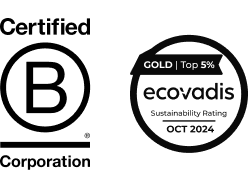For decades, the Employee Value Proposition (EVP) revolved around material, work-based rewards - think 'Friday beers', 'Generous Bonus Packages', and 'Prestige Offices'. But the changing priorities of the post-pandemic workforce have led many employers to reconsider how they pitch their business to prospective employees.
What is an EVP?
The Employee Value Proposition is the unique combination of benefits that your business offers to attract and retain the best and brightest talent in your sector. It’s what differentiates you as an employer for the ‘right fit’ candidates who will bring focus and drive to your business.
Why is EVP Important?
Research by Gartner says organisations that successfully deliver on their EVP can:
- Reduce the compensation premium needed to hire by 50%
- Reach 50% deeper into labour markets to attract passive candidates
- Decrease annual employee turnover by 69%
What Does a Typical EVP Look Like?
A few years ago, Netflix’s EVP was summed up in a job advertisement as follows:
This EVP covers all kinds of career, financial and development goals, as well as giving a good sense of what Netflix (uniquely) offers the creative professionals it wants to attract.
Why the Traditional EVP is Not Enough
Despite EVPs' popularity as a way to differentiate companies’ employee branding, they have not done much to improve employees’ long-term loyalty or solve endemic problems with recruitment.
Gartner’s research shows a persistent problem with employee engagement, which has remained relatively flat since 2016.
Not only this, but it has highlighted areas of continual struggle:
- Recruitment - Only 29% of functional leaders report they have all the talent they need to meet current performance requirements.
- Intent to stay - Only 23% of HR leaders believe most employees will continue working in their current organization after the pandemic ends.
How the Pandemic Changed Our Mindset
The Covid pandemic threw up new insights into worker’s priorities as it famously catalysed ‘the great resignation’.
In the post-Covid world, employees realised they needed more flexibility in their commuting lives and sought a better balance between work and family life.
Interestingly, businesses discovered that taking a more human-centric attitude to negotiating these changes could inspire more loyalty and unleash a new kind of productivity within their workforce.
The Future of EVP
The lessons from the pandemic have now been reflected in many company’s evolving EVPs. According to Gartner, the post-pandemic EVP is taking a more rounded view of workers as - wait for it - human beings!
The fact that treating workers like ‘humans’ might seem radical or unusual says a lot about employers’ historic priorities.
The Human Deal Framework - A New Way of Thinking
In Gartner’s so-called 'human deal framework', the most successful companies pitch themselves to talent as supporting and enriching their lives as a whole, not just their professional lives.
These companies seek to boost levels of engagement by building deeper bonds with workers that can transcend the typical divides between work and life goals.
What are the 5 Elements of the Human Deal Framework?
What are the 5 elements and how do they translate into workers' lived experience of your company?
%20copy.png?width=1000&height=1113&name=employee-value-proposition--evp--postpandemic-should-focus-on-the-why-0%20(1)%20copy.png)
1. Deeper Connections
"I feel understood"
According to Deloitte, companies who are most successful with recruitment and retention look to enrich the family lives of their employees and optimise their community connections, rather than simply focus on their work relationships.
By embracing innovations like the 4-day week, these companies continually support their employees in their work and personal lives. They are helping them make more time for family, pursue hobbies and interests, and even become involved with community work.
Progressive employers are finding ways to make their physical offices a real part of their community, too. The Havas building in London’s King's Cross is a great example of this. As Deepak Parmar, Design Director of MCM Architecture told us:
“It's a very social building. There’s a large amount of space that is given up, not to individual working but to a social coming together. They really embed themselves in the whole community. They offer up space to the schools and charities. Those organisations come in and do mentorships. It's been a building that's really touching people, not only inside but also outside its four walls.
2. Radical Flexibility
"I feel autonomous"
The most successful companies give their employees autonomy. They provide flexibility across their professional lives, helping them build the career they want in the most fulfilling way possible.
Radical flexibility allows workers not only to schedule their own hybrid work hours, but gives them more power to direct their own working practices, in order to plan and complete tasks more effectively.
This might include:
- Choosing the times and days they work
- Choosing who they work with on particular projects
- Identifying and planning their own training needs
- Supporting different collaborative groupings across changing locations
Employers who wish to support workers’ autonomy should be considering more seamless, hybrid working solutions that can digitally bridge the gap between home and office.
3. Personal Growth
"I feel valued"
Successful companies ensure that employees feel valued by helping them grow as people, not just as professionals.
So, how does your office set-up (and HR system) seek to support your employees in their broader life goals? How does it support them to improve their levels of personal happiness - and even find their ‘true self’? How is that folded into your EVP?
“Although it takes up a large amount of our time, life doesn't necessarily have to be all about work. It's because I have a job that I'm able to enjoy my personal life. And it's because I enjoy my personal life that I'm able to work hard at my job. I reckon it's precisely because I have fulfilment in both of these areas that I'm able to be my true self.”
Anonymous Millennial, Japan
4. Holistic Well-being
"I feel cared for"
Successful companies ensure employees feel cared for by promoting a holistic approach to well-being. This entails not just offering perks such as gym membership, health insurance and the like, but ensuring well-being schemes are carefully planned, properly resourced and monitored for success.
By supporting initiatives like in-house counselling services, wellness rooms and designing for neurodiversity, businesses can signal a deeper understanding and support for, complex individual needs.
You can read more about wellness rooms in this blog and discover how they are contributing to greater happiness and calm in many workplaces.
Companies who are serious about understanding the success of well-being programmes, are increasingly employing Workplace Experience Managers to devise meaningful KPIs through which they can track success.
5. Shared Purpose
"I feel invested"
Successful companies understand that their employees seek meaning and purpose in their work lives and aim to harness this energy for recruitment and retention.
According to Deloitte, 'purpose-driven' companies report, on average, 30% higher levels of innovation and 40% higher levels of workforce retention than their competitors.
If you’re looking to capture the imagination of the right candidates in the job market, defining your organisation’s 'reason for being' and integrating that into your employee branding should be a high priority.
Being a company with a shared sense of mission and purpose means more than talking the talk. Your business needs to evidence the way it works together - and how it delivers on its social and cultural goals.
This could involve shaping your workplaces as ‘destinations’ where hybrid and office workers can congregate to bond and exchange ideas — a place where teams can find a physical embodiment of your company’s culture and values.
As the Steelcase report into hybrid collaboration puts it,
“The best neighbourhoods are ones that foster inclusion and exude personality, where ideas are born and trends are launched. This is what people at work need more than ever before.”
Building a physical workplace that is vibrant and exciting, with opportunities for diverse interactions, is how ideas, creativity and company culture will continue to flourish in the future.
Conclusion
There are many ways to foster a more ‘human-centric’ approach in constructing your employee value proposition. But using the 5 elements of the human deal framework is an excellent way to ensure you're in tune with the shifting needs of a post-Covid workforce.









